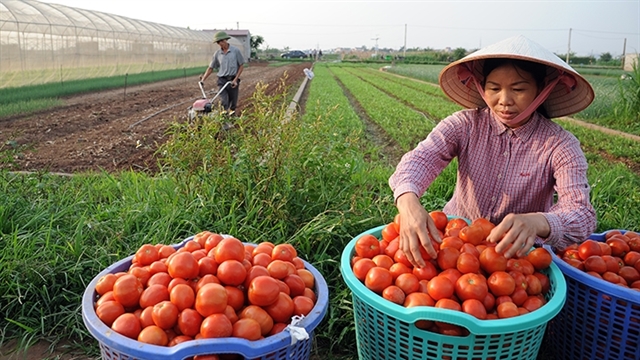 Society
Society

Legislation introduced eight years ago has created favourable conditions for the development and operation of co-operatives in Hà Nội.

|
| A member of the Chúc Sơn Fruit and Vegetable Co-operative harvests tomatoes grown under VietGap standards. — Photo nhandan.com.vn |
HÀ NỘI — Legislation introduced eight years ago has created favourable conditions for the development and operation of co-operatives in Hà Nội.
Head of Hà Nội’s Rural Development Division Nguyễn Văn Chí said the Law on Co-operatives had changed the way businesses operated and helped them adapt in a positive way to new conditions.
“Members of co-operatives are now focusing more on enhancing trade by improving their products and adopting technology in production,” he said.
“Many co-operatives have formed connections with enterprises to create supply chains,” he said.
In the city’s suburban district of Quốc Oai, Đồng Tâm Husbandry and Service was established in 2016 with ten members. Seven members are in charge of raising pigs to produce safe pork, while the other three are responsible for slaughtering, packaging and transporting the pork to stores and supermarkets.
Each member of the co-operative has 130-150 pigs, and they supply 400-500kg of pork each day, plus other products like hotdogs and spring rolls.
With clean organic products, the co-operative has found a stable market of consumers who prefer to buy food they can trust.

|
Đồng Tâm Husbandary and Service Cooperative in Quốc Oai District's Cấn Hữu Commune pursues closed pig raising chain from slaughtering, packaging and transporting pork to stores and supermarkets. With clean organic products, the co-operative has found a stable market of consumers who prefer to buy food they can trust. — Photo Hoàng Hà
In Chương Mỹ District, the Chúc Sơn Fruit and Vegetable Co-operative has made changes to satisfy the requirements of the Law on Co-operatives. It now supplies clean produce to 22 units across the country, including hospitals, schools and convenience stores.
This has helped increase members' incomes by 30 per cent annually.
The Đồng Phú Organic Agriculture Co-operative in Chương Mỹ District has also attracted nearly 100 farmers who are growing Japanese rice.
With prices from VNĐ32 million (US$1,400) per tonne, the rice can generate about VNĐ80-100 million per hectare.

|
Văn Đức Commune Organic Vegetable Cooperative in Gia Lâm District does not only provide organic vegetable and fruits to big supermarkets such as Co-opmart and Vinmart but alos exports the produce to markets including the South Korea, and Taiwan. — Photo Trịnh Bộ
Agriculture official Chí said the Government had also issued decrees, circulars and guidelines to supplement support policies for the co-operatives.
However, he said some co-operatives were still struggling to gain access to the incentives on offer.
For example, the Government was offering loans of up to VNĐ2 billion ($86,300) to co-operatives with no collateral required, but only a few co-operatives had been able to access the funding because of their modest size and lack of detailed business plans.
Complicated procedures were also blocking the effectiveness of Government’s policies, he said.
Deputy director of the city's Agriculture and Rural Development Department Tạ Văn Tường said the department was trying to spread the word about the benefits of starting new-style co-operatives models and engage more on their development.
Tường also called for more support to simplify administrative procedures and access to loans and land, while training workers and adopting technological innovations. — VNS




